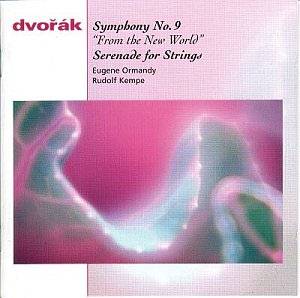It may surprise some, but this particular coupling is actually quite rare. The two pieces make interesting partners, the bite and drama of the Symphony contrasting well with the mellow warmth of the Serenade. There are literally dozens of versions of both pieces in the catalogue, many of them in modern digital sound. This Sony disc sounds its age in places, particularly the New World, which has a rather hard edge and glare in the upper registers (showing its CBS origins), but it is always worth hearing great conductors in familiar music.
Ormandy certainly coaxes playing of great character and spontaneity out of the 60s vintage LSO. The strings throughout have marvellous bite and cohesion. Sample the soaring violins at 3.32 in the first movement, or the rich cellos and basses later in the same movement. Ormandy seems fairly content to play things ‘straight’, which suits me to a degree, though some conductors, most notably Kubelik (DG) and Kondrashin (Decca), are willing to take a few more risks to bring out the life and drama beneath the notes. Nevertheless, Ormandy makes sure that precision and adherence to the score is paramount, and this brings many rewards. The great Largo is never sentimentalised, and the Scherzo has real flair and panache, with the LSO wind particularly fine. The Finale has a sense of grandeur and breadth that is very satisfying, and while there may be more individual accounts in the catalogue, this performance has a lot going for it.
Kempe’s unforced, eloquent reading of the wonderful Serenade also has its own special magic. He takes a relaxed view of the opening, shaping the lyrical first theme in a slow, affectionate way that then contrasts with the slightly sharper rhythmic point for the second subject. There is real concentration in every bar, and though the Munich strings may not be world class, they respond enthusiastically to their great conductor. The Valse movement has a lovely lilt, as well as dramatic impulse, and the engaging Scherzo is matched by the warmth of the Larghetto. I’ve heard the Finale played with a touch more Slavonic bite and precision, but Kempe keeps a firm grip on proceedings and achieves a genuinely exciting climax. The recording is also warmer and slightly more focused than the older Ormandy.
This disc enters a very crowded field but has its rewards. I found myself hearing details in both performances that marked them out, and anyone who is more interested in genuine music-making rather than state-of–the-art sound will not be disappointed, especially in the super-budget price bracket.
Tony Haywood


